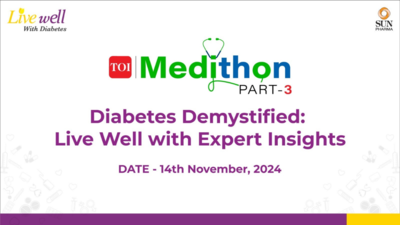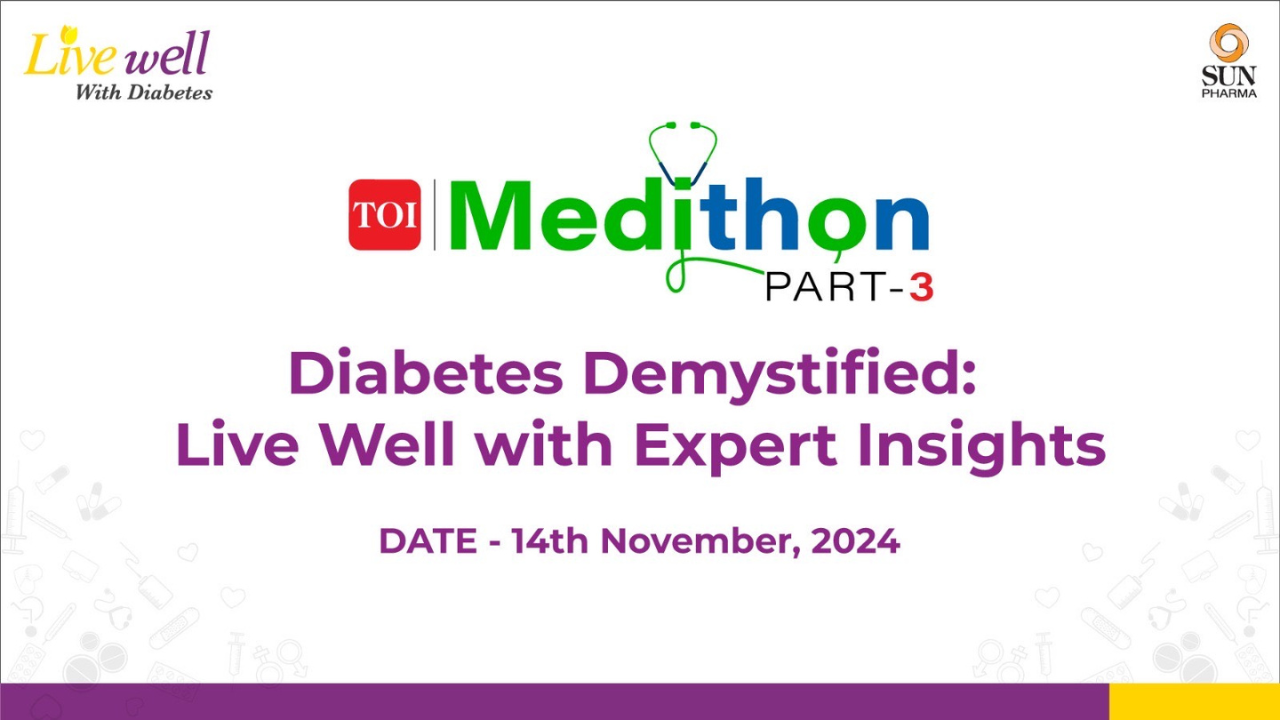Diabetes
is a chronic condition affecting millions worldwide, characterized by high blood sugar levels due to insufficient insulin production or ineffective insulin use. Left unmanaged, it can lead to severe complications, including heart disease, kidney failure, and vision loss.
Creating awareness about diabetes is crucial to promote early detection and effective management. Many people remain undiagnosed due to a lack of knowledge about symptoms such as excessive thirst, frequent urination, and unexplained weight loss. Education on healthy lifestyles, including balanced diets, regular exercise, and stress management, can significantly reduce the risk of developing type 2 diabetes.
The TOI Medithon-3 was organized with a vision to create awareness, combat stigma, and encourage individuals to seek timely medical help and adhere to treatment plans. Greater awareness can empower individuals to take proactive steps toward preventing and managing diabetes effectively.
First Session: Live Well with Diabetes- Diabetes & Obesity
Dr. Shashank Joshi, MD, DM, FACP, FACE, FRCP Consultant Endocrinologist- Lilavati Hospitals, Sir H. N. Reliance Foundation Hospital and Joshi Clinic Mumbai, India spoke about one of the most common risk factors of diabetes which is obesity. “I don’t like the word obesity, because of the stigma associated with it. It is based on an archaic yardstick called body mass index, he said. He stressed on adiposopathy and shed light on why BMI is not the right parameter to assess diabetes. “Your BMI may be normal, but you can get diabetes,” he emphasized.
Dr. P K Jabbar, MD, DM, DNB, FRCP Prof. and head, Department of Endocrinology. Director and CEO of Indian institute of Diabetes, Trivandrum talked about the factors, other than sedentary lifestyle, that can cause obesity. “Overeating is a big factor for obesity. If you are taking in excess calories it is getting deposited in various tissues,” he explained and added that drugs, genetic syndromes also contribute to obesity which needs to be taken care of.
Second session: Live Well with Diabetes: Getting to know about Diabetes
“Diabetes is a metabolic disease. It means how we utilize the fuels in the body. Insulin deficiency or resistance are the characteristic features of diabetes. Diabetes type 2 is the most common in our country,” Prof.(Dr). HB Chandalia, MD, FACP Director, Endocrinology, Diabetes and Metabolism, Jaslok Hospital, Mumbai; Director, Diabetes Endocrine Nutrition Management and Research Centre (DENMARC), Mumbai said.
Dr. Shailaja Kale, MD, FRCP, FACE, FACP, Dir. SKDC Diabetes & Speciality Clinics. Dir. Orange Diabetes Medical Foundation & Research Centre, Pune highlighted the key differences between diabetes in men and diabetes seen in women. “There are certain differences between diabetic men and women. Hormonal changes in women create the major difference,” Dr. Shailaja Kale said. Talking about what makes women prone to diabetes, she said “weight loss is difficult for women,” and added that effective weight loss strategies must be taken.
Dr. Mangesh Tiwaskar, MD, FRCP(Lon./Ire./Glas./Edin.), FACP, FICP, FGSI Diploma in Adv. Diabetology (Denmark), Consultant Physician & Diabetologist, Shilpa Medical Research Centre, Mumbai spoke about the indicative symptoms of diabetes.” There are a range of symptoms like increase in thirst, frequent urination, increased hunger, unexplained weight loss, fatigue, slow healing of wounds, are some of the common signs,” he explained.
Third session: Diabetes: Risk factors and complications
In the third session, the theme of which was diabetes risk factors and complications, Dr Sushil Gupta said, “Obesity is one of the most common risk factors for diabetes. Weight distribution is equally important. If you are accumulating more fat around your tummy. History of high BP, PCOD, if you are a mother and have given birth to a child of more than 4 kg you have a higher risk of diabetes,” he explained.
Dr Altamash and Dr Jay focused on the impact of diabetes on key organs of the body. “Diabetes means increasing blood glucose, which means there is a high risk everywhere. The weakest organ that can have this issue is the heart, kidney and brain,” Dr Altamash Shaikh, DNB (Med), DNB (Endo), MNAMS (Endo), Consultant Endocrinologist, Diabetologist & Metabolic Superspecialist, Director AMS said. Uncontrolled diabetes is a major risk to the heart, he explained.
“Diabetes is a leading cause of end stage kidney disease. Diabetes is not just a disease of sugar, it can affect all organs. One out of four individuals with diabetes might have a mild form of kidney disease,” Dr Jay Chordia, MD, DM (Endo), Consultant Endocrinologist, Paras JK Hospital & Dr Jay’s Diabetes & Hormone Care Center, Udaipur said.
Fourth session: Live well with Diabetes: Prevention, Management and Reversal
Can diabetes be reversed? Experts shared incredible answers to this question. “Lifestyle can prevent the onset of diabetes,” said Dr. Anish Ahmed K M, MD, DNB (Endo), FRCP, Consultant Senior Endocrinologist & Managing director, Endodiab Speciality Center Perinthalmanna, Kerala. “Make healthy choices in diet and that will make a great difference. Aim for complex carbs, eat non-starchy foods, polyunsaturated fats,” explains Dr Anish.
Dr. Vipin Talwar, MD, DM (Endo), DNB, FACE, Director & Sr. Consultant – Endocrinology and Diabetes at Golden Hospital, Jalandhar explains that control of diet and exercise delay and prevent the onset of diabetes and there is data supporting this. He also stressed upon obesity and its prevalence in young people. Instill diet and exercise programs at school level to reduce obesity and the spread of diabetes, he said stressing on how physical inactivity is affecting young kids these days.
Dr. Rakesh Bobba, MD, DM (Endo), Consultant Endocrinologist at Aster Ramesh Hospitals, Vijayawada spoke about specific dietary requirements to prevent diabetes. “Low calorie diet, Mediterranean diet and DASH diet have been scientifically proven to prevent diabetes.”
Education on healthy lifestyles, including balanced diets, regular exercise, and stress management, can significantly reduce the risk of developing type 2 diabetes.
Watch TOI Medithon-3 here
I’m Manas Ranjan Sahoo: Founder of “Webtirety Software”. I’m a Full-time Software Professional and an aspiring entrepreneur, dedicated to growing this platform as large as possible. I love to Write Blogs on Software, Mobile applications, Web Technology, eCommerce, SEO, and about My experience with Life.




